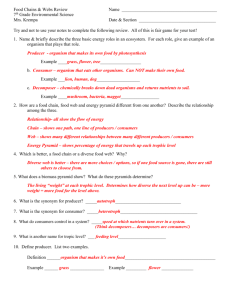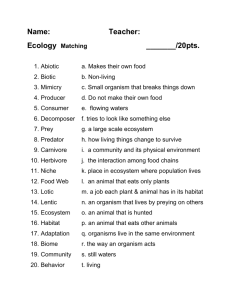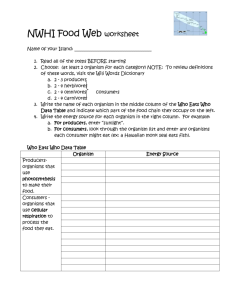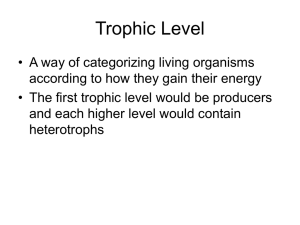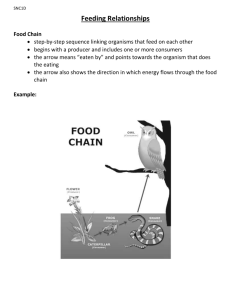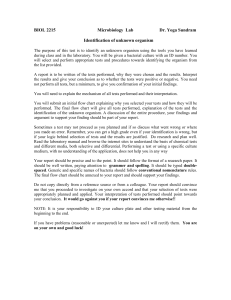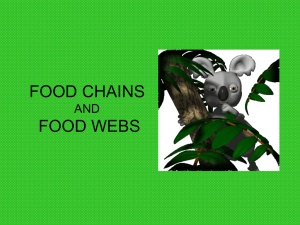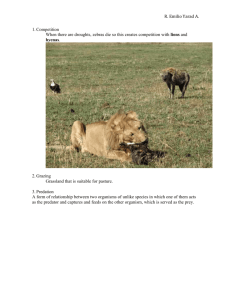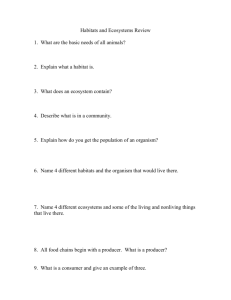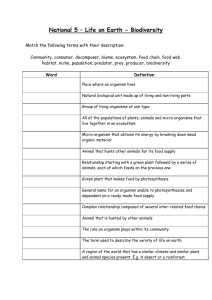Food Chains & Webs Review
advertisement
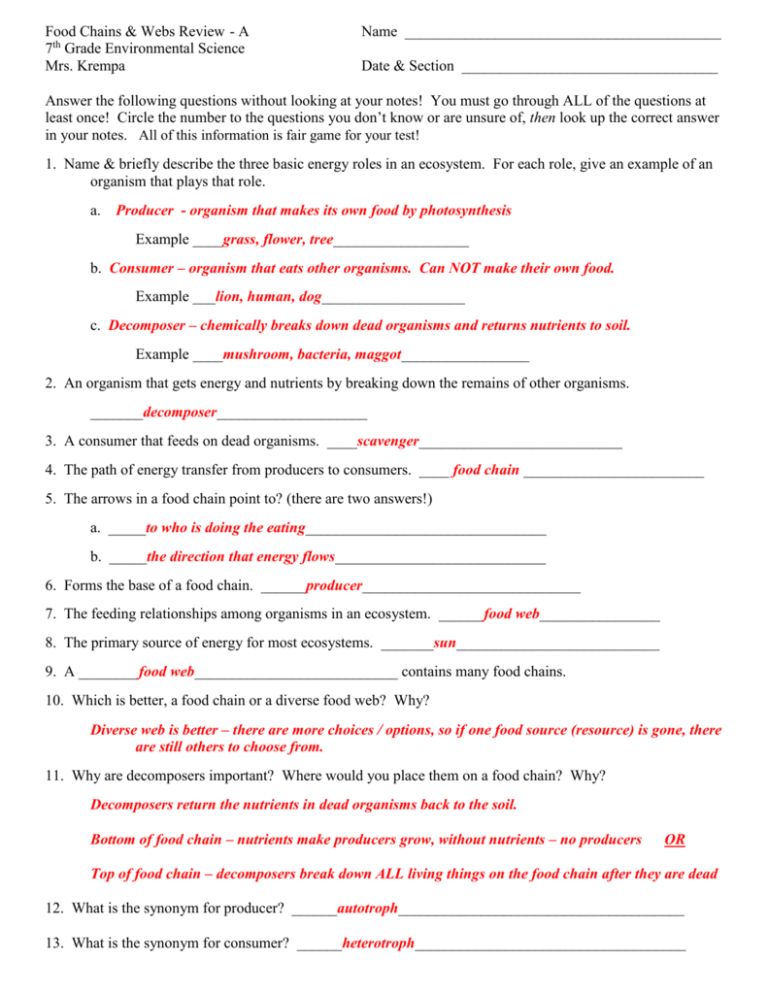
Food Chains & Webs Review - A 7th Grade Environmental Science Mrs. Krempa Name __________________________________________ Date & Section __________________________________ Answer the following questions without looking at your notes! You must go through ALL of the questions at least once! Circle the number to the questions you don’t know or are unsure of, then look up the correct answer in your notes. All of this information is fair game for your test! 1. Name & briefly describe the three basic energy roles in an ecosystem. For each role, give an example of an organism that plays that role. a. Producer - organism that makes its own food by photosynthesis Example ____grass, flower, tree__________________ b. Consumer – organism that eats other organisms. Can NOT make their own food. Example ___lion, human, dog___________________ c. Decomposer – chemically breaks down dead organisms and returns nutrients to soil. Example ____mushroom, bacteria, maggot_________________ 2. An organism that gets energy and nutrients by breaking down the remains of other organisms. _______decomposer____________________ 3. A consumer that feeds on dead organisms. ____scavenger___________________________ 4. The path of energy transfer from producers to consumers. ____ food chain ________________________ 5. The arrows in a food chain point to? (there are two answers!) a. _____to who is doing the eating________________________________ b. _____the direction that energy flows____________________________ 6. Forms the base of a food chain. ______producer_____________________________ 7. The feeding relationships among organisms in an ecosystem. ______food web________________ 8. The primary source of energy for most ecosystems. _______sun___________________________ 9. A ________food web___________________________ contains many food chains. 10. Which is better, a food chain or a diverse food web? Why? Diverse web is better – there are more choices / options, so if one food source (resource) is gone, there are still others to choose from. 11. Why are decomposers important? Where would you place them on a food chain? Why? Decomposers return the nutrients in dead organisms back to the soil. Bottom of food chain – nutrients make producers grow, without nutrients – no producers OR Top of food chain – decomposers break down ALL living things on the food chain after they are dead 12. What is the synonym for producer? ______autotroph______________________________________ 13. What is the synonym for consumer? ______heterotroph____________________________________ 14. Define producer. List two examples. Definition ___ organism that makes its own food by photosynthesis Example ____grass, tree_______ Example ____ flower_____________ 15. Define primary consumer. List two examples. Definition ______consumer that directly eats a producer. Herbivore. _____________________ Example ______ moo cow____________ Example ________ rabbit_______________ 16. Define secondary consumer. List two examples. Definition _____ consumer that eats a primary consumer. Omnivore or carnivore.________________ Example _____frog, shrew, mouse______ Example ______lizard, snake_________________ 17. Define tertiary consumer. List two examples. Definition ______ consumer that eats a primary or secondary consumer. Omnivore or carnivore. Example ____Lion______________ Example _______Hawk_________________ 18. What is the name of the process plants use to make their own food? ____Photosynthesis___________ 19. List two examples of the following consumers… herbivore ______moo cow__________ Carnivore _______lions, tigers, _______________ ______deer______________ _______ sharks, Eagles _____________ Omnivore human bear, shrew, mouse Coyote, goat, Robin, Blue Jay scavenger _____ hyena, vulture_________________ ____ raccoon, crow, fox __________________ Chicken 20. Circle the answer of the term includes the living and non-living parts. A. Ecosystem B. Niche C. Community 21. Circle the answer of the term includes only the living parts. A. Ecosystem B. Niche C. Community 22. Circle the answer of the term that describes the “job” of an organism, what an organism does in its habitat. A. Ecosystem B. Niche C. Community 23. On another sheet of paper, draw an energy pyramid. Include numbers (calorie or percent), an organism at each level and label each level as producer, primary consumer, secondary consumer or tertiary consumer. *KEEP GOING! There’s a food web to look at!! 24. Use the food web below to answer the following questions. a. List two primary consumers from this web. Caterpillar, Rabbit, Squirrel, Mouse b. List two secondary consumers from this web. Thrush, Hawk, Fox, Weasel c. List two tertiary consumers from this web. Hawk, Fox d. List one organism that could be placed at more than one level in this food web. Identify what levels they could be on. Organism: Hawk Levels: secondary when it eats Rabbit, tertiary when it eats Thrush that eats caterpillar then grass Organism: Fox Levels: secondary when it eats Rabbit, tertiary when it eats mouse that eats caterpillar then grass There are other examples… ! Thrush Acor n 25. Draw two chains from the web above. Label each organism as producer, primary consumer, secondary consumer or tertiary consumer. 1. Grass Rabbit Fox 2. Grass Caterpillar Thrush Hawk #23.
